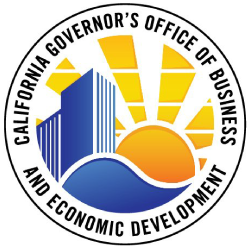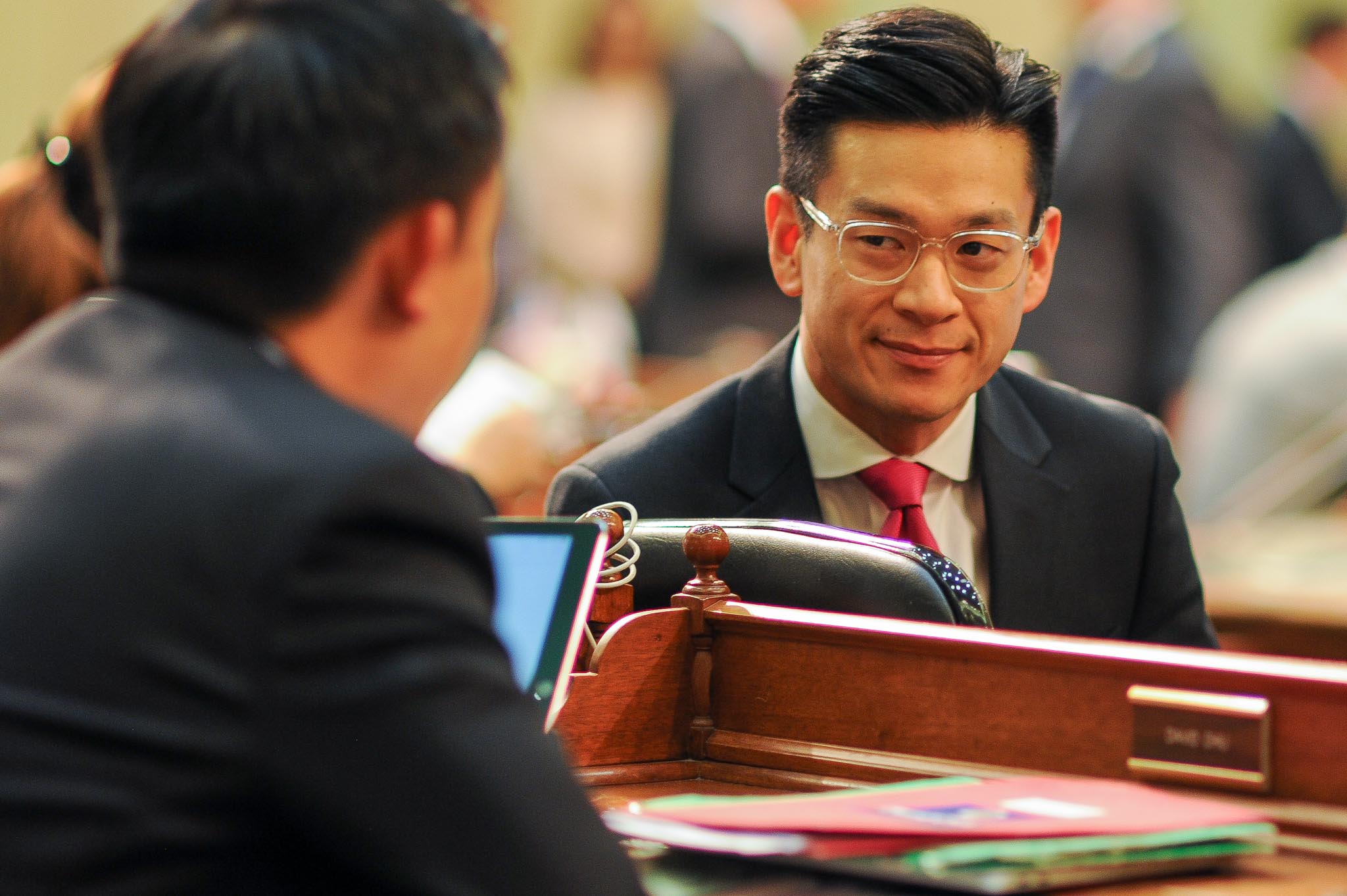
GO-Biz. (Photo: business.ca.gov)
Calif. Economic Development Budget Trailer Bill Establishes ‘California Competes Grant Program’
SB 151 renames the program the ‘California Inclusive Innovation Hub Program’
By Chris Micheli, July 13, 2021 2:30 pm
The Legislature passed and Governor Newsom signed on July 12 Senate Bill 151 (Budget and Fiscal Review Committee) [Chapter 74], which is the economic development budget trailer bill. The bill amends Sections 12099.1, 12099.2, 12099.3, 12099.4, 10299.5, 12099.6, 12099.7, 12100.61, 12100.62, 12100.63, 12100.65, 12100.67, 12100.83, and 13995.44 of, and adds and repeals Article 4.4 (commencing with Section 12096.6) and Article 9 (commencing with section 12100.90) of Chapter 1.6 of Part 2 of Division 3 of Title 2, and Sections 12100.83.5 and 12100.83.6 of, and repeals Section 12099 of, the Government Code, and amends Section 18410.2 of, and adds Article 8 (commencing with Section 19292) to Chapter 5 of Part 10.2 of Division 2 to, and adds and repeals Section 17158.1 of, the Revenue and Taxation Code.
SB 151 revises and recasts the California Innovation Hub Program. The bill provides that GO-Biz limit the iHub2s within the state to stimulating partnerships, economic development, and job creation for underserved geographic areas, industry sectors, and business owners. An iHub2 is a partnership between interrelated firms, local governments, economic development organizations, educational entities, and industries that collectively drive economic growth within a defined geographic area and for defined underserved geographic areas, industry sectors, and business owners.
SB 151 requires that $50 million of the California Small Business COVID-19 Relief Grant Program be allocated in one more funding rounds, rather than in a single round, to eligible nonprofit cultural institution.
SB 151 requires the California Travel and Tourism Commission to annually provide a report to the Joint Legislative Budget Committee, as well as the Assembly Committee on Budget and the Senate Committee on Budget and Fiscal Review.
SB 151 moves the administration of the California Small Business Development Technical Assistance Expansion Program within the duties of the California Office of the Small Business Advocate and its director also referred to as the Small Business Advocate. The bill also makes a finding of legislative intent, in accordance with specified federal law, in connection with allowing persons who are undocumented to receive consulting and training services and microgrants pursuant to the program.
SB 151 also requires the California Office of the Small Business Advocate, upon appropriation of necessary funds, to establish a grant program designated as the California Dream Fund Program, to provide specified grants in connection with the above-described program to be disbursed through California Small Business Technical Assistance Expansion Program grantees.
SB 151 creates, until January 1, 2030, and upon appropriation, a California Competes Grant Program to provide grants to an applicant that meets specified criteria relating to the creation of jobs or investments in the state, following the receipt of a fully executed written agreement containing certain provisions between the office and a qualified grantee. Applicants cannot have received a California Competes tax credit for the same jobs or investments for which the grant is to be allocated.
SB 151 creates the California Nonprofit Performing Arts Grant Program within CalOSBA. The purpose of the program is to provide grants to eligible nonprofit performing arts organizations to encourage workforce development. Subject to appropriation by the Legislature, the bill requires $50 million to be allocated in one or more rounds to eligible nonprofit performing arts organizations that meet certain criteria. The bill requires these grants to be awarded on a first-come, first-served basis in specified amounts depending on the applicant’s annual gross revenue in the 2019 taxable year.
SB 151 creates the California Venues Grant Program within CalOSBA. The purpose of the program is to provide grants to eligible independent live events that have been affected by COVID-19 in order to support their continued operation. Subject to appropriation by the Legislature, the bill requires $150 million to be allocated in one or more rounds to eligible independent live events that meet certain criteria. The bill sets forth parameters for prioritization of grants and requires these grants to be in an amount equal to the lesser of $250,000 or 20% of gross earned revenue for the 2019 taxable year.
SB 151 establishes the California Microbusiness COVID-19 Relief Grant Program within the CalOSBA to assist qualified microbusinesses that have been significantly impacted by the COVID-19 pandemic. The bill requires CalOSBA to administer a Request for Proposal (RFP) in no more than 2 rounds for a specified period of time per round for eligible grantmaking entities defined as a county or consortium of nonprofit community-based organizations.
SB 151 excludes from gross income grant allocations made pursuant to the California Microbusiness COVID-19 Relief Grant Program for taxable years beginning on or after January 1, 2020 and before January 1, 2023.
Section One of the bill adds Article 4.4 to Chapter 1.6 of Part 2 of Division 3 of Title 2 of the Government Code to create the California Competes Grant Program. It defines the terms “applicant,” “California Competes Grant Program,” “Committee,” ”GO-Biz,” “qualified grantee,” and “recaptured grant amount.” It requires GO-Biz to establish the program upon appropriation by the Legislature. The grants provided by GO-Biz are for applicants who meet at least one of three specified criteria. Written contracts are required between the applicant and GO-Biz, and GO-Biz is required to consider certain factors when determining whether the grantee will influence the creation of jobs in this state. There is a process for recapturing the grant under specified conditions. This section of law is repealed January 1, 2030.
Section Two of the bill repealed Government Code Section 12099. Section Three of the bill amends Government Code Section 12099.1 to make the program the California Inclusive Innovation Hub Program. Section Four of the bill amends Government Code Section 12099.2 adds additional definitions to the law. Section Five of the bill amends Government Code Section 12099.3 to add additional definitions to the law. Section Six of the bill amends Government Code Section 12099.4 for a technical change. Section Seven of the bill amends Government Code Section 12099.5 for a technical change.
Section Eight of the bill amends Government Code Section 12099.6 to add definitions to the law. Section Nine of the bill amends Government Code Section 12099.7 to make minor changes to the law. Section Ten of the bill amends Government Code Section 12100.61 to make legislative findings and state the intent of the Legislature. Section Eleven of the bill amends Government Code Section 12100.62 to add definitions to the law and define the term “private funding source,” “small business technical assistance center,” and “Small Business Advocate.”
Section Twelve of the bill amends Government Code Section 12100.63 to specify alternatives when an applicant is not a federally contracted small business technical assistance center. It also establishes the California Dream Fund Program to provide microgrants up to $10,000 that are disbursed through California Small Business Technical Assistance Expansion Program grantees. Section Thirteen of the bill amends Government Code Section 12100.65 to make a technical change. Section Fourteen of the bill amends Government Code Section 12100.67 to make technical changes. Section Fifteen of the bill amends Government Code Section 12100.83 to specify the total of $50 million for the program funds are allocated in one or more rounds to eligible nonprofit cultural institutions.
Section Sixteen of the bill adds Government Code Section 12100.83.5 to create the California Venues Grant Program. Its purpose is to provide grants to eligible independent live events that have been affected by COVID-19 in order to support their continued operation. GO-Biz will allocate grants to eligible independent live events that meet specified requirements and defines “eligible venue” and “eligible independent live event.” It uses specified North American Industry Classification System codes to determine those who are eligible for the grants. It also excludes certain entities from eligibility.
In addition, there are detailed rules for grants to be awarded. It caps the total amount of grants to $25 million. Grant moneys awarded can only be used for costs resulting from COVID-19 pandemic and related health and safety restrictions, or business interruptions or closures incurred as a result of the COVID-19 pandemic. This section is repealed on December 31, 2022.
Section Seventeen of the bill adds Government Code Section 12100.83.6 to create the California Nonprofit Performing Arts Grant Program, whose purpose is to provide grants to eligible nonprofit performing arts organizations to encourage workforce development. The section specifies requirements for the organizations to meet. $50 million of program funds are to be allocated in one or more rounds to these organizations. It specifies the types of eligible organizations. Grants are awarded on a first-come, first-served basis and the law specifies the amount of the grants based upon the annual gross revenue of the applicant. Grant moneys are limited to specified types of expenses. This section is repealed on December 31, 2022.
Section Eighteen of the bill adds Article 9 to Chapter 1.6 of Part 2 of Division 3 of Title 2 of the Government for creation of the California Microbusiness COVID-19 Relief Grant Program. This section defines the terms “CalOSBA,” “Program,” “California Small Business COVID-19 Relief Grant Program, “eligible grantmaking entity,” “fiscal agent,” “grantmaking agreement,” “qualified microbusiness,” and “qualified microbusiness owner.” The section limits the amount of funds that can be used for administrative expenses.
The program will administer a Request for Proposal in no more than two open rounds to all 58 county governments as eligible grantmaking entities. Funds will be allocated based on the county’s estimated population. Criteria to be used is specified for the selection of a county fiscal agent. Thereafter, a grantmaking entity that receives an allocation must administer a county program that includes numerous, specified provisions. Detailed reporting requirement for the grants are also included. This section of law remains in effect until December 31, 2022.
Section Nineteen amends Government Code Section 13995.44 to require the commission to provide reports to specified legislative committees. Section Twenty of the bill adds Revenue and Taxation Code Section 17158.1 to specify that, for tax years between January 1, 2020 and January 1, 2023, gross income does not include grant allocations received by a taxpayer pursuant to the California Microbusiness COVID-19 Relief Program that is administered by the Office of Small Business Advocate.
Section Twenty-One of the bill amends Revenue and Taxation Code Section 18410.2 to make technical changes to the law.
Section Twenty-Two of the bill adds Article 8 to Chapter 5 of Part 10.2 of Division 2 of the Revenue and Taxation Code concerning the Collection of Recaptured California Competes Grants. This section defines the terms “California Competes Grant Program,” “committee,” “GO-Biz,” “qualified grantee,” and “recaptured grant amount.” GO-Biz must provide to the Franchise Tax Board a list of qualified grantees and their respective recaptured grant amounts as approved.
Section Twenty-Three of the bill makes findings and declarations related to the limitation on the public’s right of access to the meetings of public bodies or the writings of public officials. Section Twenty-Four of the bill specifies that no reimbursements to local agencies or school districts is required. Section Twenty-Five of the bill provides that the provisions of this act are severable. Section Twenty-Six of the bill provides that this bill is a budget bill and takes effect immediately.
- Probate Code Could Be a Basis for Statutory Interpretation Principles - February 22, 2026
- Conservation Banks - February 22, 2026
- Mergers of Unincorporated Associations - February 21, 2026




